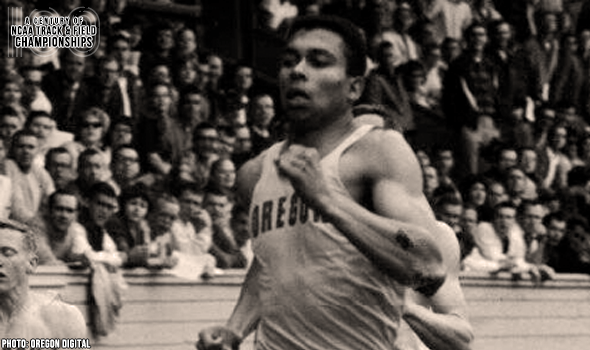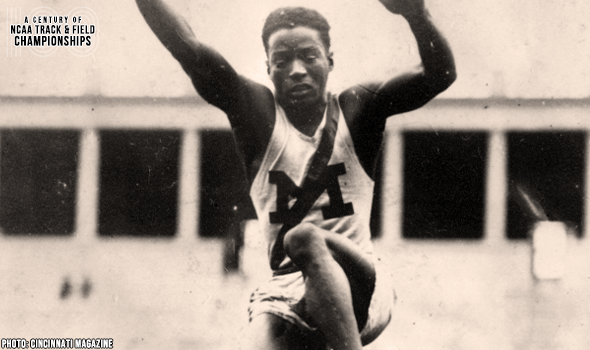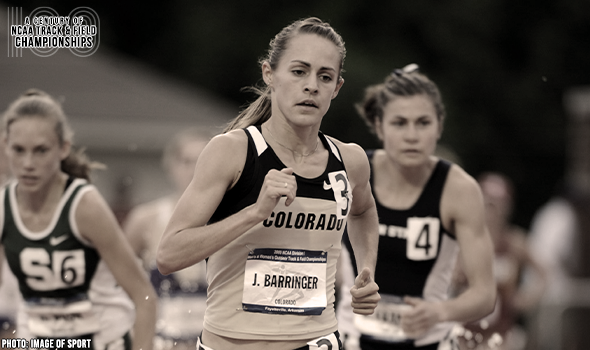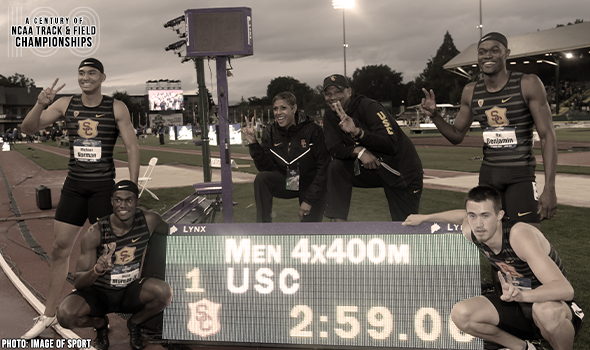
Oregon’s Jerome Sprinted To NCAA Glory
If ever a meet could have used photo-finish timing, it was the 1964 NCAA Outdoor Track & Field Championships.
The 5000 and 400 were both ruled deadlocks, but those were with merely two runners inseparable.
The 100-meter final saw three sprinters crossing the line at almost the same instant: Harry Jerome of Oregon, Edwin Roberts of North Carolina Central and Trenton Jackson of Illinois.
It took almost an hour to sort the finish, but when they did, Jerome was ruled the victor in 10.1. Roberts (second) and Jackson (third) were also credited with that same mark as well.
“Honestly, that’s one I’d hate to judge on,” Jerome said about the finish to Dick Leutzinger of the Eugene Register-Guard. “Usually I know when I win or lose. I’d hate to say on that one.”
While the 10.1 was a meet and collegiate record, it wasn’t a PR for Jerome. He still owned a share of the world record of 10.0 that he set in the summer after his freshman season back in 1960.
Jerome was a Canadian prodigy who came from great lineage. As a high school standout in North Vancouver, British Columbia, he broke a 31-year-old national record in the 220 yards. And many knew his grandfather, John Armstrong Howard, who was the first Black athlete to represent Canada in the Olympic Games.
The fact that Jerome was even running in 1964 – near his best, let alone at all – was a comeback story for the ages. Jerome tore his quadriceps tendon in the fall of 1962 at the British Commonwealth Games and the seriousness of the injury led many to believe that he would never run again. He didn’t believe that and a little over a year later, he opened the 1964 season by equaling the world indoor best in the 60-yard dash with his time of 6.0.
Then at the 1964 NCAA Championships, Jerome doubled back in the 200, taking third to lead Oregon to its second team title in three years – both at Hayward Field. The Ducks won their first national title in 1962 when Jerome won the 220 yards and was runner-up in the 100.
Not long after that, Jerome went to the Tokyo Olympic Games, where he earned his lone Olympic medal – a bronze in the 100.
Jerome died in 1982 of a brain aneurysm at age 42. In 1984, the Labatts Classic held in Burnaby was renamed the Harry Jerome Classic and in 1988 a statue of him was erected in Vancouver’s Stanley Park.
The NCAA and collegiate track & field will mark a momentous milestone in the spring of 2021 -- the 100th anniversary of the NCAA Championships and with that, the NCAA Track & Field Championships. In June 1921, the University of Chicago hosted the first track & field championships in NCAA history.
This point can’t be emphasized enough: Not only was the event the first for NCAA track & field, but the first championships for any sport under the sponsorship of the NCAA.
To celebrate, over each of the next 365 days, the U.S. Track & Field and Cross Country Coaches Association (USTFCCCA) will celebrate moments, student-athletes, and coaches that have made a century’s worth of championships special. From humble beginnings to important historical milestones to the modern-day, collegiate track & field has evolved with the American society.
The 2021 edition of the NCAA Division I Outdoor Track & Field Championships begin with preliminary round action on May 27-29 in Jacksonville, Fla., and College Station, Texas. The championships final site and culmination of the celebration is slated for June 9-12, 2021 at the newly rebuilt Hayward Field in Eugene, Ore.

Oregon’s Burleson Races To Meet’s First Sub-4 Mile
ON THIS DAY: Dyrol Burleson of Oregon recorded the first sub-4 minute mile in meet history at the NCAA Outdoor Track & Field Championships. Burleson finished in 3:59.8 and used a 55.2 closing lap to seal the deal.

Nebraska’s Greene Equals 100-Yard World Record
ON THIS DAY IN 1967: Charlie Greene of Nebraska equaled the world record in the 100 yards with his time of 9.1 at the NCAA Division I Outdoor Track & Field Championships.

Twice As Nice For Texas’ Richards In 2003
ON THIS DAY: Sanya Richards of Texas became the first freshman (man or woman) to win the 400 & double back to anchor the winning 4×400 relay team.

Hubbard Makes World History At NCAAs
ON THIS DAY: DeHart Hubbard of Michigan achieved the first ratified world record ever set at the NCAA Championships in 1925.

Barringer Caps Legendary Collegiate Career
Exactly 11 years ago, Jenny Barringer of Colorado became the first woman to win the steeplechase three times in a career at the NCAA Division I Outdoor Track & Field Championships.

Villanova’s Reid Completes Historic 1500-5K Double
Sheila Reid of Villanova completed the first 1500-5K double at the same NCAA Division I Outdoor Track & Field Championships on June 11, 2011!

Brazier Makes History Two Laps At A Time
Donavan Brazier of Texas A&M set the collegiate record of 1:43.55 in the Men’s 800 Meters at the 2016 NCAA Track & Field Championships.

Wottle Leads Eight Men Under Four Minutes
On this day in 1973, Dave Wottle of Bowling Green led eight runners under the 4-minute barrier for the mile – just the second time such depth had occurred anywhere in the world.

Fight On! Southern California’s Historic Day
Three collegiate records in 80 minutes is what Southern California’s men’s team did ON THIS DAY back in 2018.

Holloway’s Texas Two-Step Into The Record Book
On this day in 2019, Grant Holloway of Florida broke Renaldo Nehemiah’s 40-year-old collegiate record in the Men’s 110 Hurdles.

